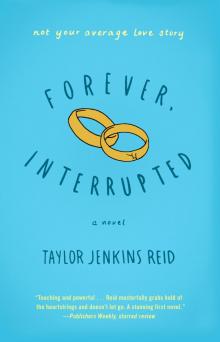- Home
- Taylor Jenkins Reid
One True Loves Page 14
One True Loves Read online
Page 14
There were some missteps along the way. He ate a few fish that made him vomit. He drank the water faster than it replenished. But he also found oysters and mussels growing on the shoreline and during a particularly relentless rainstorm managed to store over a week’s worth of water—getting him ahead of the game. During the scorching sun of midday, he hung the deflated raft between two rocks and slept in the shade. Soon, he figured out a fairly reliable routine.
Jesse was eating raw fish, barnacles, and food bars, drinking rainwater, and hiding from the sun. He felt stable. He felt like he could make that work for as long as he needed to until we found him.
But then, after a few weeks, he realized we were never going to find him.
He says he had a breakdown and then, after, an epiphany.
That’s when Jesse started training.
He knew that he couldn’t spend the rest of his life living alone on a small patch of rocks in the Pacific. He knew his only way out was the very thing he had been raised to do.
He trained to swim a race.
He counted his strokes and each day swam out farther than he had the day before.
He started out slow, frailer and more fatigued than he’d ever been.
But after a few months, he was able to make it far out into the ocean. He felt confident that one day he’d be strong enough to swim the open water as long as he had to.
It took him almost two years to work up the stamina and the guts to do it. He had setbacks both minor (a jellyfish sting) and major (he saw a shark circling the rocks on and off for a few weeks). And when he finally set out for good, it wasn’t because he believed that he could make it.
It was because he knew he’d die if he didn’t.
He had run out of food bars long ago and the oysters had dried up. Half of the raft had been torn and lost to the wind. He feared that he was not growing stronger but weaker.
There was a rainstorm that brought him days’ worth of water. He drank as much as he could and managed to strap a few bottles on his back using pieces of the raft.
And then he got in the water.
Ready to find help or die trying.
He does not know exactly how long he was out in the open sea and he lost count of the strokes. He says he knows it was less than two days when he saw a ship.
“And that’s when I knew it was all over,” he says. “That I would be OK. That I was coming home to you.”
He never mentions his finger. In the whole story, in his telling me everything, he never mentioned that he lost half of his finger. And I don’t know what to do because I agreed not to ask anything more. I start to open my mouth, to ask what I know I’m not supposed to. But he cuts me off and I get the message. We’re done talking about that now.
“I thought of you every day,” he says. “I have missed you for all these years.”
I start to say it back and then realize I’m not sure if it’s true. I thought of him always—until one day I thought of him less. And then I thought of him often but . . . that’s not really the same thing.
“You were always in my heart,” I finally say. Because I know that’s true. That’s absolutely true.
No matter how much history Jesse and I have shared, no matter how much we may feel like we understand the other, I’m not sure I can ever understand the pain of living alone in the middle of the ocean. I don’t know if I can ever truly appreciate the courage it takes to swim the open water.
And while I’m in no way comparing the two, I don’t think Jesse can understand what it feels like to believe the love of your life is dead. And then to be sitting across from him in your car off the side of the road.
“Now you go,” he says.
“Now I go?”
“Tell me everything,” he says. The minute he says it, I know that he knows I’m engaged. He knows everything. Between the acute awareness of his voice and the sense of “here it comes” that lives in his focused eyes and tight lips, I can tell he figured it out on his own.
Or he noticed my diamond ring.
“I’m engaged,” I say.
Then, suddenly, Jesse starts laughing. He looks relieved.
“What? Why are you laughing? Why is this funny?”
“Because,” he says, smiling, “I thought you were already married.”
I feel a smile erupt across my face even though I can’t tell you where, exactly, it comes from.
And then I start laughing and playfully hit him. “It’s practically the same thing!” I say to him.
“Oh, no, it’s not,” he says. “No, it absolutely is not.”
“I’m planning to marry someone else.”
“But you haven’t yet.”
“So?” I say.
It’s so easy to talk to him. It was always easy to talk to him. Or maybe it’s just that I’ve always been good at it.
“I’m saying that I have spent the last three and a half years of my life hoping with everything I have in me to see you again. And if you think that you being engaged to someone else is going to stop me from putting our life back together, you’ve lost your goddamn mind.”
I look at him, and at first the smile is still spread wide across my face, but soon, reality starts to set in and the smile fades. I put my head in my hands.
I am going to hurt everyone.
The car becomes so quiet all I can hear is the roll of the cars whizzing past us on the road.
“It’s more complicated than you realize,” I say finally.
“Emma, look, I get it. You had to move on. I know everybody did. I know that you thought I was . . .”
“Dead. I thought you were dead.”
“I know!” he says, moving toward me, grabbing my hands. “I can’t imagine how hard that must have been for you. I don’t want to imagine it. All these years, I knew you were alive, I knew I had you to go back to. And I know you didn’t have that. I’m so sorry, Emma.”
I look up at him and I can see there are tears in his eyes to match the ones forming in mine.
“I’m so sorry. You have no idea how sorry. I should never have done it. I should never have left you. Nothing on this earth, no experience I could ever have, would be worth losing you or hurting you the way that I did. I used to lay awake at night and worry about you. I would spend hours and hours, days, really, worried about how much you must be hurting. Worried about how you and my mother and my whole family must be aching. And it nearly killed me. To know that the people I loved, that you, you, Emma, were grieving for me. I am so sorry that I put you through that.
“But I’m home now. And what drove me to get home, what kept me going, was you. Was coming home to you. Was coming back to the life that we had planned. I want that life back. And I’m not going to let the decisions that you made when you thought I was gone affect how I feel about you now. I love you, Emma. I’ve always loved you. I never stopped loving you. I’m incapable of it. I’m incapable of loving anyone but you. So I absolve you of anything that happened while I was gone and it’s now our time. Our time to put everything back together the way it was.”
It’s now so hot in the car that I feel like I have a fever. I turn down the heat and I try to wrestle out of my jacket. It’s hard, in the small space of the driver’s seat, to wiggle left and right just enough to get my arms out. Jesse, wordlessly, takes hold of one of the sleeves and pulls for me, helping me finally free myself.
I look at him, and if I push away the shock and the confusion and the bittersweetness, what I’m left with is extreme comfort. Opening my eyes and seeing his face staring back is more like home than anything I can remember. Right here in this car is the best part of my teenage years, the best part of my twenties. The best part of me. The whole beginning of my life is this man.
The years he’s been gone have done nothing to erase the warmth and comfort we have from the years we spent in each other’s lives.
“You were the love of my life,” I say.
“I am the love of your life,” Jesse says. “Nothing’s
changed.”
“Everything has changed!”
“Not between us, it hasn’t,” he says. “You’re still the girl with the freckles under her eye. And I’m still the guy that kissed you in the police station.”
“What about Sam?”
It is the first time I see sadness and anger flash over Jesse’s face. “Don’t say his name,” he says, moving away from me. The sharpness of his tone disarms me. “Let’s talk about something else. For now.”
“What else could we possibly talk about?”
Jesse looks out the window for a moment. I can see his jaw tense, his eyes fixate on a point. And then he relaxes and turns back to me. He smiles. “Seen any good movies?”
Despite myself, I’m laughing and soon he is, too. That’s how it’s always been with us. I smile because he’s smiling. He laughs because I am laughing.
“This is really hard,” I say when I catch my breath. “Everything about this is so . . .”
“It doesn’t have to be,” he says. “I love you. And you love me. You’re my wife.”
“I don’t even think that’s true. When you were declared dead, it . . . I mean, I don’t even know if we’re still married.”
“I don’t care about a piece of paper,” he says. “You’re the woman I’ve spent my entire life loving. I know that you had to move on. I don’t blame you. But I’m home now. I’m here now. Everything can be the way it’s supposed to be. The way it should be.”
I shake my head and wipe my eyes with the back of my hand. “I don’t know,” I say to Jesse. “I don’t know.”
“I know.”
Jesse leans forward and wipes away the tears that have fallen down my neck.
“You’re Emma,” he says as if that’s the key to all of this, as if the problem is that I don’t know who I am. “And I’m Jesse.”
I look at him, half smiling. I try to feel better the way he wants me to. I try to believe that things are as simple as he is telling me they are. I can almost believe him. Almost.
“Jesse—”
“It’s going to be OK, OK?” he says. “It’s all going to be fine.”
“It is?”
“Of course it is.”
I love him. I love this man. No one knows me the way he knows me, no one loves me the way he loves me.
There is other love out there for me. But it’s different. It isn’t this. It isn’t this exact love. It’s better and it’s worse. But I guess that’s sort of the point of love between two people—you can’t re-create it. Every time you love, everyone you love, the love is different. You’re different in it.
Right now, I want nothing but to revel in this love.
This love with Jesse.
I throw myself into his arms and he holds me tight. Our mouths are now close together, our lips just a few inches from touching. Jesse moves the littlest bit closer.
But he doesn’t kiss me.
Something about that strikes me as the most gentlemanly thing he has ever done.
“Here is what we are going to do,” he says. “How about you drop me off at my parents’? It’s getting late and my family is probably wondering where I am. I can’t . . . I can’t keep them wondering where I am . . .”
“OK,” I say.
“And then you head home. To wherever you live,” he says. “Where do you live?”
“In Cambridge,” I tell him.
“OK, so you go home to Cambridge,” he says.
“OK.”
“Where do you work? Are you at a magazine or freelance?” Jesse asks expectantly.
I’m almost hesitant to disappoint him. “I’m at the bookstore.”
“What are you talking about?” he says.
“Blair Books.”
“You work at Blair Books?”
“I moved back here after you . . .” I drift off and go another route. “I started working there. And now I really like it. Now it’s mine.”
“It’s yours?”
“Yeah, I run it. My parents are in and out, sort of. Mostly retired.”
Jesse looks at me as if he can’t compute it. And then he changes his face entirely. “Wow,” he says. “I did not expect that.”
“I know,” I say. “But it’s good. It’s a good thing.”
“All right,” he says. “Then I’d imagine you’ll be at the bookstore tomorrow?”
“I usually get in around nine. Open at ten.”
“Can I see you for breakfast?”
“Breakfast?”
“You can’t expect me to wait until lunch to see you . . .” he says. “Breakfast is already too long.”
I think about it. I think about Sam. With guilt weighing me down, I start to speak.
Before I can respond, Jesse adds, “C’mon, Emma. You can have breakfast with me.”
I nod. “Yeah, OK, yeah,” I say. “Seven thirty?”
“Great,” he says. “It’s a date.”
It is just after eight when I pull into the parking lot of my apartment. I tighten my coat as I step out. The wind is starting to pick up, the temperature dropped as the sun went down, and I can feel the rough breeze and the cold air on my shoulders and neck. I rush into my building.
I walk into the elevator. I press the button for the fifth floor. I watch the elevator close and as it does, I close my eyes.
When he asks me what happened today, what do I say?
How do I tell the truth when I don’t know what it is?
I’m so lost in my own thoughts that I jump when the elevator dings and the doors open.
Standing in the hallway, right at our front door, is Sam.
Beautiful, kind, fractured, heartbroken Sam.
“You’re back!” he says to me. “I thought I saw your car pull up in front just now when I was taking out the trash but I wasn’t sure. I . . . I called you earlier, a few times actually, but I never heard from you, so I wasn’t sure when you were coming home.”
He wasn’t sure if I was coming home.
His eyes are glassy. He’s been crying. He seems to think that if he’s peppy enough I won’t notice.
“I’m sorry.” I put my arms around him and feel him lean into me. His relief is palpable. “I lost track of time.”
We head back into our apartment. The moment the door is open, I can smell tomato soup. Sam makes the most incredible tomato soup. It is spicy, light, and sweet.
I come around the corner into the kitchen and I can see that he has ingredients out to make grilled cheese, including vegan cheddar because I’m convinced I’m growing lactose intolerant.
“Oh, my God,” I say to him. “You’re making tomato soup and grilled cheese for dinner?”
“Yeah,” he says, trying to act cool, putting in considerable effort to make his voice sound carefree. “I thought it might be nice since it’s so cold today.”
He moves toward the cutting board and starts assembling sandwiches as I put my bag on the table and sit down at the counter. I watch him, carefully grating cheese, softly buttering the bread, as I unzip my boots and put them by the door. Sam’s hands are shaking ever so slightly. His face looks pained, as if it’s working overtime just to remain even.
It aches to look at him, to know that he’s trying so hard to be OK right now, that he’s trying to be understanding and patient and secure, when he’s anything but. He is standing there, putting a frying pan down over a medium flame, trying to pretend that the fact that I saw my (former?) husband today isn’t tearing him up inside.
I can’t put him through this any longer.
“We can talk about it,” I say to him.
He looks up at me.
Mozart walks into the kitchen and then turns around, as if he knows he doesn’t want to be here for this. I watch as he joins Homer under the piano.
I grab Sam’s hand. “We can talk about anything that is on your mind; you can ask me anything you want. This is your life, too.”
Sam looks away from me and then nods.
He turns off the flame.<
br />
“Go ahead. Whatever you want to know. Just ask me. It’s OK. We’re gonna be honest and we’re gonna be OK.” I don’t actually know what I mean by that, about us being OK.
He turns to me. “How was he?” Sam asks.
“Oh,” I say, surprised that Sam’s first question is about Jesse’s well-being.
“He’s OK. He’s good. He seems . . . like he’s adjusting.” I don’t mention that he seems almost bizarrely unflappable, that he is singularly focused on restoring our marriage.
“How are you?”
“I’m OK, too,” I say. “I’m a little stunned by everything. It’s very weird to see him. I’m not sure what to make of it.” I’m choosing vague words because I’m afraid to narrow anything down. I’m afraid to commit to any particular feeling more than another. I honestly don’t know what words I’d choose even if I was committed to specifics.
Sam nods, listening. And then he breathes in and asks what he really wants to know. It’s clear the first two questions were warm-ups and this is game time. “Did you kiss him?”
It’s funny, isn’t it? So often men see betrayal in what you’ve done instead of how you feel.
“No,” I say, shaking my head.
Sam is instantly relieved but I feel worse. I’m getting by on a technicality. Jesse didn’t even try to kiss me, so I don’t know if I would have let him, or if I would have kissed him back. But I still get credit as if I’d resisted. I don’t feel great about that.
“I’d understand if you did kiss him,” Sam says. “I know that . . . I guess what I’m saying is . . .”
I wait for him to finish his sentence but he doesn’t finish it. He just gives up, as if it’s too overwhelming to try to choose words for his thoughts.
I know how he feels.
He turns the burner on again and goes back to making sandwiches.
“You’re in an impossible situation,” I tell him. I want him to know that I understand what he’s going through. But I could never really understand it, could I? I have no idea what it’s like to be him right now.
“You are, too,” he says.
We’re both playing the same game with each other. We want to understand, we want to make the other person feel understood, but the truth is we’re on opposite sides of the street right now, looking over at each other and imagining what life must be like.

 Daisy Jones & the Six
Daisy Jones & the Six The Seven Husbands of Evelyn Hugo
The Seven Husbands of Evelyn Hugo Malibu Rising
Malibu Rising Malibu Rising: A Novel
Malibu Rising: A Novel After I Do
After I Do Forever, Interrupted
Forever, Interrupted Maybe in Another Life
Maybe in Another Life One True Loves
One True Loves